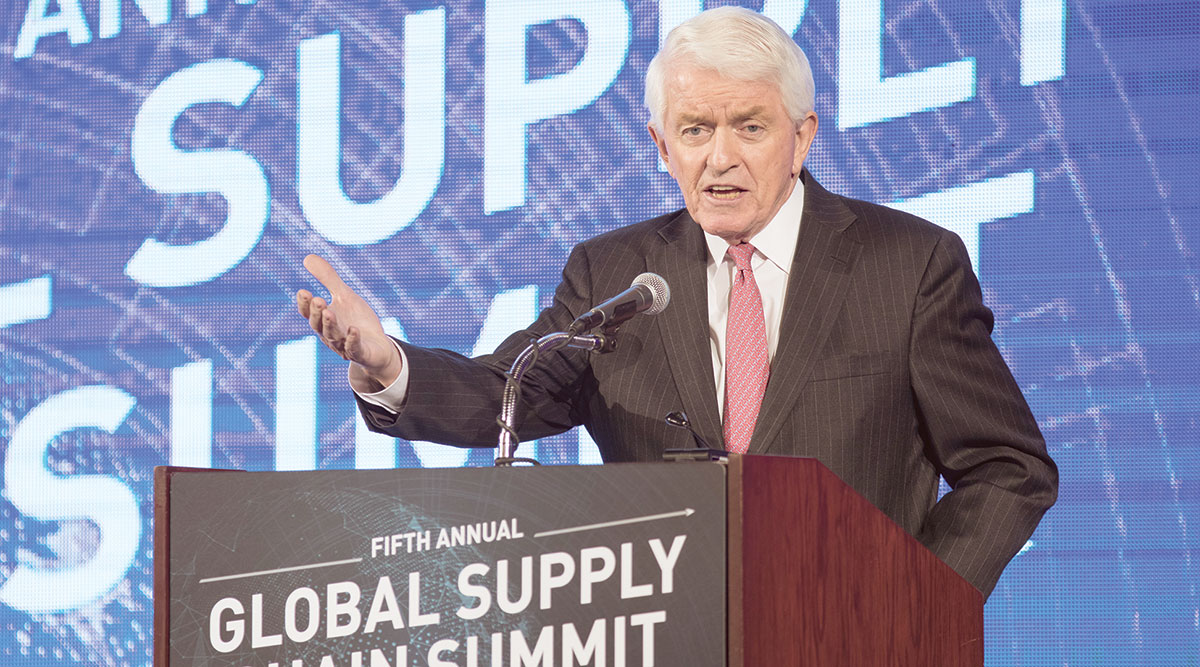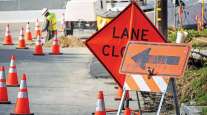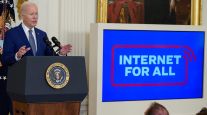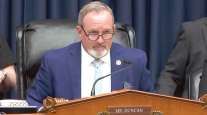Senior Reporter
Donohue Hopes Infrastructure Bill Spurs Economy While Fixing Roads

This story appears in the May 22 print edition of Transport Topics.
WASHINGTON — U.S. Chamber of Commerce President Thomas Donohue says the Trump administration’s $1 trillion infrastructure bill should attempt to mitigate highway bottlenecks, promote long-term economic growth and update regulations to make private investment more attractive.
“Supplies can only be sourced and shipped as quickly as the infrastructure allows,” Donohue said at a Chamber Infrastructure Week event last week. “One outdated corridor or inefficient border can create bottlenecks that are very significant.”
Those bottlenecks are caused not just by roads and bridges but also by airports, intermodal connectors, computers, information and money — all issues that can make the U.S. less competitive, Donohue told industry leaders at the Chamber’s fifth annual Global Supply Chain Summit.
LIVEONWEB REPLAY: Infrastructure Week Reporter Roundtable
Donohue was reacting to a plan by President Donald Trump to introduce an infrastructure bill that he has yet to outline.
A blueprint of the president’s plan could come soon, Transportation Secretary Elaine Chao said during an Infrastructure Week speech.
“Twenty-first century infrastructure needs to account for 21st-century technology,” Donohue said. “One big problem, even if today we got that trillion dollars, we couldn’t use it on infrastructure. We have to fix the [work] permitting process and, more than that, we’ve got to find out where we’re going to find the workers.
“Right now, we’re a country of people without jobs and massive numbers of jobs without people,” he added.
He also expressed concerns about plans by the Trump administration to renegotiate the North America Free Trade Agreement. He said the Chamber has hired a trade representative to present the organization’s views in any discussions.
“Amend it, don’t end it,” Donohue said of NAFTA.
“We don’t simply trade with Canada and Mexico. We make things together, our supply chains are highly integrated and our economies are interdependent,” Donohue said. “Is there room for NAFTA to be modernized? You bet.” But he said the conversation on how to fix NAFTA has to begin with a recognition of just how important it is.
“First, do no harm,” he said. “We can’t disrupt the 14 million jobs in this country that depend on the trade with Mexico and Canada, or the $1.3 trillion in trade that crosses our borders annually.”
Other speakers at the May 17 event, ranging from federal law enforcement officials to trucking and business executives, updated attendees on a wide variety of current and future supply chain issues, including cybersecurity and goods movement security, seaport infrastructure, and technology.
Gil Kerlikowske, former U.S. Customs and Border Protection commissioner, expressed concerns about the effects of current and past administrations’ delay in filling leadership posts at a number of agencies, including the Transportation Security Administration and CBP.
“Government needs leaders,” Kerlikowske said.
Kerlikowske said that whether agency employees are happy or not with their leaders, they can set a tone and be helpful in international negotiations. “They have such an impact on business,” he said.
Juan Perez, chief information officer at UPS Inc., stressed the importance of improving supply chain technology.
“For any company that wants to be in the right place when the future arrives, we have to make those investments now,” Perez said. “The simple mantra is this: Think big or lose big. Move fast or lose ground.”
Other presenters at the event centered on critical infrastructure needs.
“As you all know, our interstate highway system was built in the ’50s and ’60s,” said Ed Mortimer, the Chamber’s executive director of transportation infrastructure. “It’s not just time to fix it; it’s time to modernize and improve it.”
Bill Sullivan, executive vice president of advocacy for American Trucking Associations, said, “For truckers, we’re talking about the highway being our office. … We believe that there has to be sustainable, dedicated infrastructure spending.”
With estimates of 30% growth in freight over the next decade, Sullivan said, truckers are willing to pay increased user fees.




